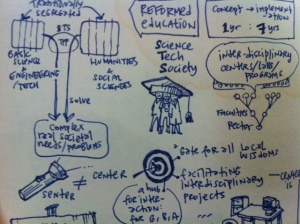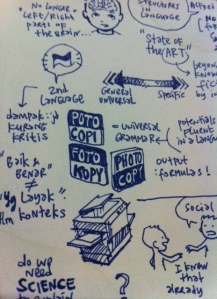Some pointers I noted from the first session of “The Role of Science, Technology and Arts in Predicting Social Phenomena” seminar, held by the Research Group for Humanity Studies (Faculty of Arts and Design), Institute of Technology Bandung on July 11th, 2012.
From the opening speech by ITB Vice Rector for Academic Affairs and Student Affairs:
There is a connection between cellular phones, motorbike-taxi, and the logging of Gunung Kidul forest. Forest farmers cut down more trees of the forest, even the younger ones, to be able to afford cellular phones and motorbikes. These farmers, who used to use the motorbike-taxi service to get home, are now able to call their sons, who now now have their own motorbikes, to pick them up. The motorbike-taxi service gradually disappeared, and so did the trees, and – following – so did these farmers’ jobs, due to the diminishing woods to harvest. Considering this circle, it is obvious that (the desire for) technology influences social conditions.
The biggest challenges faced by (American) scientists of today are health, material science and sustainable energy.
So far, engineers have been considering only the output of the technology: function, effectiveness, and all other tangible and quantifiable results. They rarely consider the intangible result: the impact to society.
From the speech of Ir. Ary Mochtar Pedju, M.Arch:
Developed countries have science and technology-based economy. Developing countries will never cross the line that borders between industry-based economy and technology-based economy.
Technologically-excluded regions are within a poverty trap. These regions are prone to infectious disease, low productivity and environmental degradation.
Referring to MIT, the traditionally-segregated disciplines: Basic Science & Engineering/Technology and Humanities & Social Sciences, are merging and forming a new group called Science Technology Society, which solves complex, real societal needs/ problems.
We need reformed education.
Universities should have inter-disciplinary centers/ labs/ programs that drive the faculties (and then the hierarchic structure), and not the other way around.
An inter-disciplinary “center” should not be a mere physical office(!). It should be a gate for all local wisdom, a hub for interaction for Government, Business and Academic entities, and should facilitate interdisciplinary projects.
We should examine the cultural & institutional context in which science and technology are rooted.
We need to write history books with broad-based analysis that include the use of technology and how it influence our society in all aspects: economy, politics, etc.
From the discussion session:
There should be a revolution to our middle-school education: eliminate the divisions of Science and Social majors.
The Indonesian language is, for most Indonesians, a second language, since it is common for Indonesians to speak a region’s language as their mother tongue. As the impact, Indonesians become non-critical to Indonesian language. Therefore, the term “Speaking Indonesian language properly and correctly” should be replaced with “Speaking Indonesian language appropriately and according to context”.




